Local hubs are becoming an increasingly popular way to take part in events, from research conferences and hacker congresses to Internet governance and RIPE events. In this article, we explore the benefits of decentralising event organisation, how it helps foster community building through diversity and inclusion, and how it promotes environmental sustainability.
Before we get into it, first a shout out on two upcoming RIPE NCC events.
RIPE 89
We want to make it easier for those who can’t attend a RIPE Meeting in person to still engage meaningfully with the event. If you'd like to create a space for people in your city to connect, consider organising a Local Hub at RIPE 89, and help bring the global RIPE experience closer to home!
Apply for RIPE 89: 28. October - 1. November 2024
Hackathon
Our next hackathon is focused on ecological sustainability - therefore, we are organising it in a decentralised way. You can join online, in person in Amsterdam, or as a Local Hub participant / host!
Apply for the Green Tech Hackathons, 10-11. December
Issues with big, centralised events
Local hubs are addressing the issues that I have noticed in many community events - misplaced focus on growth, increased need for traveling and the tyranny of a centralised location.
Bigger is not always better
When the community is maturing, community events tend to to grow in size. As conferences grow larger, they bring about a number of challenges. Large events tend to require expensive luxury venues, often dependent on commercial sponsorship - and/or higher entrance ticket costs that make them unaffordable for specific categories of people (younger, from poorer regions, or otherwise already marginalised groups). This can foster an exclusive, “in-group” culture where only certain people feel included.
More attendees also mean higher CO2 emissions due to long-distance travel. Larger events make it harder to manage issues like misbehaviour and harassment. Additionally, large-scale events tend to focus on growth over meaningful engagement.
Geographic barriers - the challenge of one location
Organisers of traditional events must choose one location for every event. Each event location comes with its own set of limitations. Visa requirements and local legal frameworks can exclude certain participants. Cultural factors, including intolerance or human rights issues, may prevent others from attending. Moreover, economic disparities mean that for many, the cost of attending a conference - including travel, accommodation, and registration fees - is a significant barrier.
These obstacles highlight the differences in power and privilege among attendees and they increase inequality!
Air travel in research culture - a sustainability problem
In academic research, attending conferences is often seen as essential for career growth. However, this comes at a significant environmental cost. Frequent air travel contributes heavily to global warming, as researchers are expected to present their work at conferences regularly, often necessitating long flights. This reliance on air travel makes the academic community one of the larger contributors to emissions through professional travel.
While the academic communities have researched this topic (see publications in the appendix), same concerns are valid for the communities coordinating technical operations of Internet infrastructure, standards and other Internet Governance aspects.
Solution: Local Hubs!
Smaller, decentralised events, or "local hubs", offer a promising alternative. Here’s how they improve both diversity and environmental sustainability:
Diversity
Local hubs make it easier for people with caregiving responsibilities, disabilities, or other personal needs to participate, as they don’t require long trips or complicated logistics. Travel time is reduced, freeing up more time for the actual event, and local events tend to be cheaper, allowing people from lower-income backgrounds to attend. Additionally, local hubs bypass the need for visas, making participation more equitable.
Sustainability
By reducing travel distances, local hubs significantly lower carbon emissions. These events also push back against consumerism, as they avoid unnecessary travel expenses and typically require smaller, more affordable venues. With smaller gatherings, there’s also less demand for heating, cooling, and ventilation, reducing the overall energy footprint.
Health benefits
Local hubs offer the added benefit of making it easier to enforce health measures. Since they involve smaller groups, it’s simpler to implement social distancing, mask-wearing, and other preventive measures, reducing the risk of spreading illnesses like COVID-19.
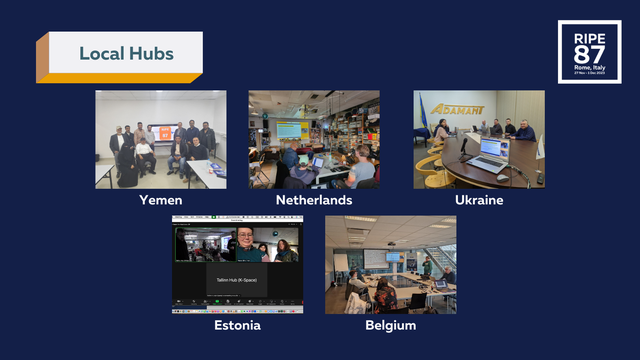
Examples of traditional local hubs
Local hubs aren’t entirely new. There have been several successful implementations in various fields, including:
- "Congress Everywhere" by Chaos Communication Congress (CCC): An event that encourages smaller, decentralised gatherings across different locations, fostering global participation without the need for mass travel.
- Remote Hubs at the Internet Governance Forum (IGF) : A platform that uses local hubs to involve participants from diverse locations, ensuring inclusivity in governance discussions.
- RIPE Meetings: RIPE has been utilising local hubs to enable wider participation, promoting accessibility and inclusion.
Decentralisation - the next step towards federated events
While local hubs are a step in the right direction, they often still follow the "central and satellite" model, where a main event is supported by smaller satellite events. The future lies in fully decentralised or federated events, where there is no single "main" event, and every local hub is equally significant.
The benefits of federated events
Federated events encourage a shift away from the traditional, hierarchical event structure. Smaller, decentralised gatherings foster more meaningful connections, reducing burnout and emphasising community support over profit. These events often adopt alternative, creative formats that break away from standard lectures and panels, creating space for everyone to contribute equally.
Decentralisation also promotes modesty and mutual aid, with local communities supporting each other rather than relying on commercial sponsorships. In fully federated events, there is no need for centralised broadcasting or top-down leadership. All participants are encouraged to engage actively, making the event more democratic and inclusive.
Examples of decentralised / federated events I helped organise:
- Queering Wikimedia May 2023
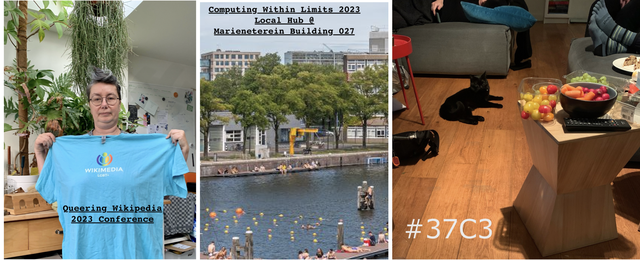
Conclusion - embrace local hubs!
Local hubs are more than just a trend—they are a solution to many of the problems that large conferences face today. They foster diversity, sustainability, and inclusivity by removing geographic, economic, and legal barriers. Decentralising events, whether through local hubs or fully federated models, creates healthier, more meaningful gatherings that prioritise the community’s needs over commercial gain.
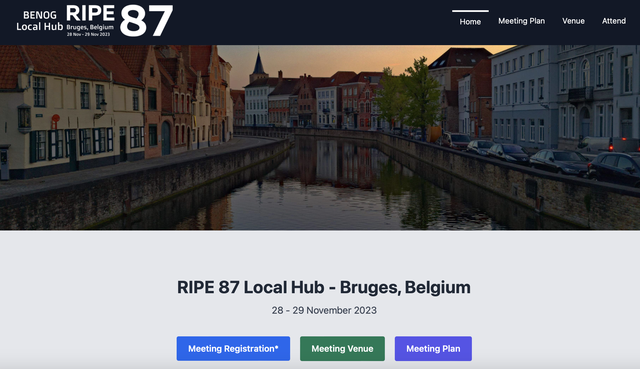
Appendix
Additional examples of promoting more sustainable academic events:
- A NEARLY CARBON-NEUTRAL CONFERENCE MODEL (University of California at Santa Barbara)
- FIELDNOTES ON FLYINGLESS CONFERENCING (European Association for the Study of Science and Technology)
- SIGPLAN and Climate Change (Special Interest Group on Programming Languages)
- EPFL Travel Directives (École Polytechnique Fédérale de Lausanne)
- 2018: Instructions on How to Organise a Hackathon - applicable for Local Hubs too!


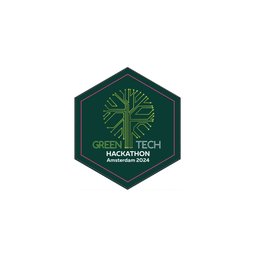
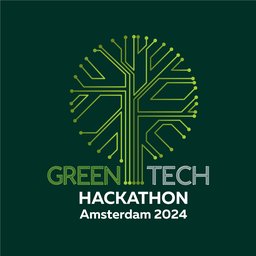
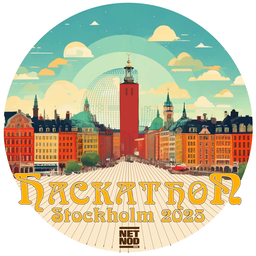
Comments 1
The comments section is closed for articles published more than a year ago. If you'd like to inform us of any issues, please contact us.
Vesna Manojlovic •
Here’s an inspirational view about a similar event: > “ the problems… are symptoms of bigger, more complex problematic situation. It has a violent cascading effect in different levels of scale and contexts, and it feels never-ending. “ sharing dilemmas : > “what are we doing to address the bigger picture? FOSDEM is part of a system of ways we connect with each other. How much of our perceived disconnect with the conference stems from deeper issues with the established ways of connection — in person, in a Global North country with a perspective centered in the Global North, in a season with heightened health risks, incurring significant costs?“ & suggesting that solutions include dreaming big — and decentralization: > “ We need you to free your mind from your ideas of what seems impossible, and we need to decentralize.” https://notapplicable.dev/daring-to-dream https://fluconf.online/sessions/daring-to-dream-reclaiming-our-connections-and-building-our-resilience/